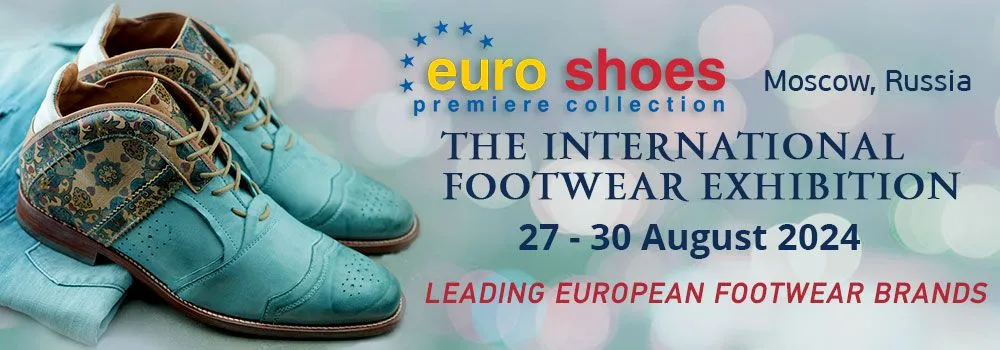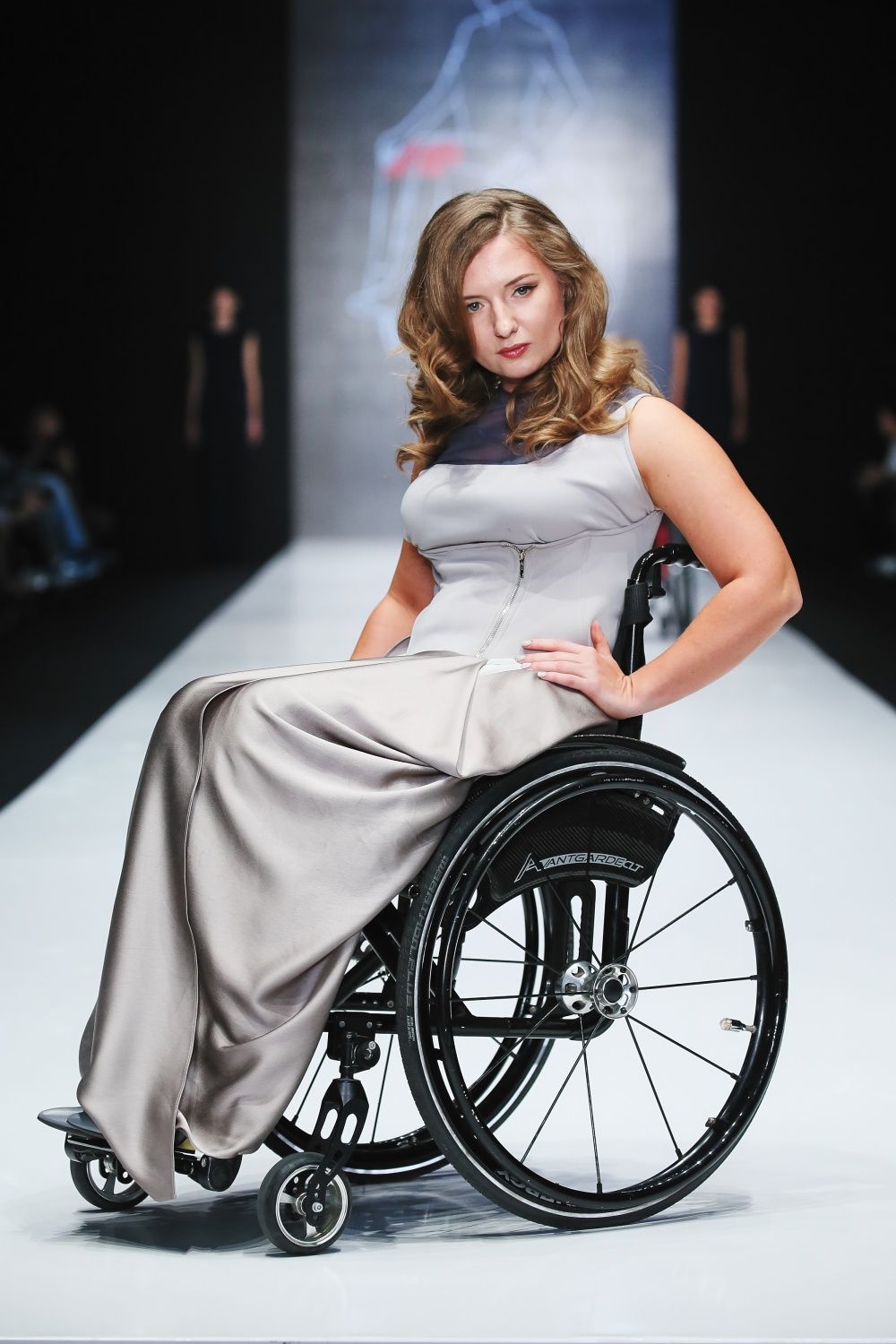
Niche of unlimited possibilities

The tyranny of the standard of ideal beauty is increasingly shaken by democratic ideas about the breadth of the concept of beauty and the equality of all people. The right to vote in the fashion market is given to those population groups whose needs were previously ignored. Today we are no longer simply not surprised, but admired on the catwalk and in advertising by models in old age, full, short, non-standard appearance, with unusual leather pigmentation, models with developmental disabilities and disabilities. True, in Russia, with rare exceptions, we still have to watch these global trends from the computer screen and mobile devices.
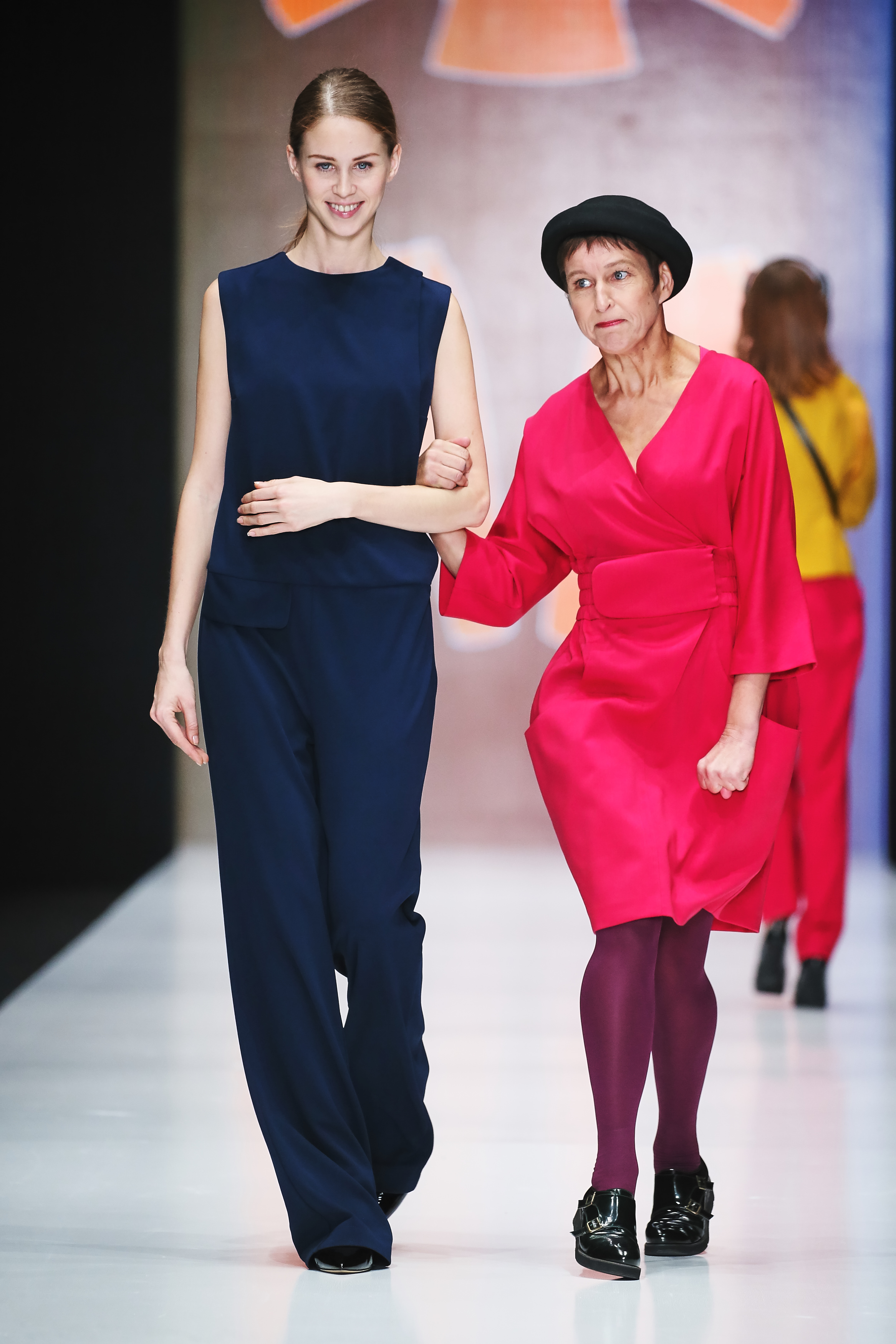 One of these rare exceptions is the Bezgraniz Couture project, for which designers develop fashion collections designed for people with disabilities. This year, the Bezgraniz Couture collection "wearABLE future", created by students of the British Higher School of Art and Design in Moscow, was shown at Mercedes-Benz Fashion Week Russia at the Manezh. The show was attended by non-professional models - people using a wheelchair, amputated, cerebral palsy and Down syndrome. The audience gave a standing ovation. But this is not so much a sign of growing social tolerance, which, judging by the recent scandal with her sister Natalia Vodianova, still leaves much to be desired, as a sign of welcome and recognition by the Russian fashion industry of the new target audience.
One of these rare exceptions is the Bezgraniz Couture project, for which designers develop fashion collections designed for people with disabilities. This year, the Bezgraniz Couture collection "wearABLE future", created by students of the British Higher School of Art and Design in Moscow, was shown at Mercedes-Benz Fashion Week Russia at the Manezh. The show was attended by non-professional models - people using a wheelchair, amputated, cerebral palsy and Down syndrome. The audience gave a standing ovation. But this is not so much a sign of growing social tolerance, which, judging by the recent scandal with her sister Natalia Vodianova, still leaves much to be desired, as a sign of welcome and recognition by the Russian fashion industry of the new target audience.
We would venture to suggest that the fashion market, oppressed by the crisis, sees in it partly its own reflection, but above all, of course, the potential for commercial gain, but Yanina Urusova herself emphasizes that Bezgraniz Couture is not a charitable project. No matter how cynical it may sound, it turns out that the limited capabilities of some people open up wide opportunities and a new niche for others who produce clothes and shoes. The company "Econika", which provided shoes for the show Bezgraniz Couture "wearABLE future", has already taken note of this idea. Other companies are likely to follow soon. Because after the show at the Manege, the results of the world's first research on the purchasing power of people with disabilities, conducted by experts from the School of Art and Design, Nottingham Trent University, UK, took place. “The demand for clothes and accessories that take into account the peculiarities and limitations of the body is huge, but there is practically no supply,” Yanina Urusova, founder of Bezgraniz Couture, summed up his conclusion.
| Please rate the article |
Materials on the topic
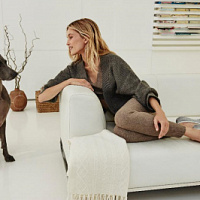
Shoes mixed with clothing and decor
Online fitting rooms and 3D avatars have already become a reality. What's next?

Shoe educational program: what shoe soles are made of

Membrane: legs warm, dry, comfortable. About the features of membrane baby shoes
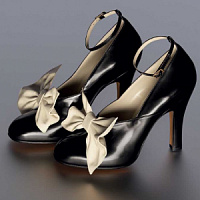
"Italy in Hollywood", an exhibition opened at the Salvatore Ferragamo Museum in Florence
Popular
 Louis Vuitton opens a new factory in Italy
Louis Vuitton has opened its second shoe factory in Italy. After opening the first one in Fiesso d'Artico in Veneto, the LVMH flagship brand has just opened a new production site dedicated to this category of footwear in the industrial zone of Civitano in the Marche region. There is also another brand production facility in Tuscany, where bags and leather accessories are produced, writes fr.fashionnetwork.com.
Louis Vuitton opens a new factory in Italy
Louis Vuitton has opened its second shoe factory in Italy. After opening the first one in Fiesso d'Artico in Veneto, the LVMH flagship brand has just opened a new production site dedicated to this category of footwear in the industrial zone of Civitano in the Marche region. There is also another brand production facility in Tuscany, where bags and leather accessories are produced, writes fr.fashionnetwork.com.
 American buyers couldn't buy Birkin bags and sued Hermès
French fashion house Hermès is facing a lawsuit in California from two customers who were unable to purchase exclusive Birkin bags. The fashion house is accused of unfair commercial practices.
American buyers couldn't buy Birkin bags and sued Hermès
French fashion house Hermès is facing a lawsuit in California from two customers who were unable to purchase exclusive Birkin bags. The fashion house is accused of unfair commercial practices.
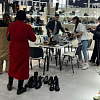 The Euro Shoes @ CAF exhibition was successfully held in Almaty
The Euro Shoes @ CAF exhibition was successfully held in Almaty. From March 11 to 13, the international exhibition of clothing, footwear and accessories Euro Shoes @ CAF was held in Almaty with great success.
The Euro Shoes @ CAF exhibition was successfully held in Almaty
The Euro Shoes @ CAF exhibition was successfully held in Almaty. From March 11 to 13, the international exhibition of clothing, footwear and accessories Euro Shoes @ CAF was held in Almaty with great success.  We are ready for active development in the Russian market
Friedrich Naumann, CEO of the Tamaris brand, told Shoes Report about the company’s ambitious plans, business development in Russia and expansion of the retail network, and also shared details about new collections and launches.
We are ready for active development in the Russian market
Friedrich Naumann, CEO of the Tamaris brand, told Shoes Report about the company’s ambitious plans, business development in Russia and expansion of the retail network, and also shared details about new collections and launches.
 “Discount for repairs” of clothes and shoes in France supported workshops
The French have calculated the benefits of a program that encourages consumers to repair clothes and shoes by providing discounts on these services in certified workshops. The “repair discount” program began operating in France in November last year. Over the six months of operation of this program, the number of calls to repair shops in France increased 10 times and amounted to 250 repairs. The French saved 000 million euros, writes leparisien.fr.
“Discount for repairs” of clothes and shoes in France supported workshops
The French have calculated the benefits of a program that encourages consumers to repair clothes and shoes by providing discounts on these services in certified workshops. The “repair discount” program began operating in France in November last year. Over the six months of operation of this program, the number of calls to repair shops in France increased 10 times and amounted to 250 repairs. The French saved 000 million euros, writes leparisien.fr.
 Omnichannel on the shelves. What is it, which companies are it suitable for and should they follow this trend?
The technologies we use in life and business are developing rapidly: in the last 10 years alone, many new sales channels and communication with audiences have appeared. This progress influences consumer behavior and cannot be stopped.
Omnichannel on the shelves. What is it, which companies are it suitable for and should they follow this trend?
The technologies we use in life and business are developing rapidly: in the last 10 years alone, many new sales channels and communication with audiences have appeared. This progress influences consumer behavior and cannot be stopped.
 Why is it so important to work with customer reviews, analyze them and use them in your work?
Customer reviews are of great, invaluable importance when selling a product. However, many companies do not always understand this: they do not collect reviews, respond only to positive ones and do not work with negative ones. This is a big mistake and omission of the brand. In this article, together with SR digital marketing expert Tatyana Vasilyeva, we understand the intricacies and nuances of working with customer reviews and explain why it is worth paying attention to your customer reviews, and how this can increase your sales.
Why is it so important to work with customer reviews, analyze them and use them in your work?
Customer reviews are of great, invaluable importance when selling a product. However, many companies do not always understand this: they do not collect reviews, respond only to positive ones and do not work with negative ones. This is a big mistake and omission of the brand. In this article, together with SR digital marketing expert Tatyana Vasilyeva, we understand the intricacies and nuances of working with customer reviews and explain why it is worth paying attention to your customer reviews, and how this can increase your sales.
 Coach turned to Big Data analysis and won the interest of a young audience
American handbag brand Coach has planned the success of its Tabby model among a younger audience, Generation Z, by turning to big data analysis, abandoning traditional and analogue tools, such as human intuition or the ability of any executive to sense “which way the wind will blow,” writes B.O.F.
Coach turned to Big Data analysis and won the interest of a young audience
American handbag brand Coach has planned the success of its Tabby model among a younger audience, Generation Z, by turning to big data analysis, abandoning traditional and analogue tools, such as human intuition or the ability of any executive to sense “which way the wind will blow,” writes B.O.F.
 The Euro Shoes@CAF exhibition will be held in Almaty
From March 11 to 13, the Euro Shoes@CAF (Central Asia Fashion) exhibition will be held in Almaty at the Atakent exhibition complex. The exhibition, which is the largest international event in the fashion industry in Central Asia, will present collections of clothing, shoes and accessories.
The Euro Shoes@CAF exhibition will be held in Almaty
From March 11 to 13, the Euro Shoes@CAF (Central Asia Fashion) exhibition will be held in Almaty at the Atakent exhibition complex. The exhibition, which is the largest international event in the fashion industry in Central Asia, will present collections of clothing, shoes and accessories.
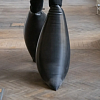 New “dutik” from Rick Owens presented at the show in Paris
Strange bulky shoes are another trend of our troubled times, and it’s impossible to ignore. American designer Rick Owens presented voluminous inflated latex boots at a show in Paris, which, according to him, were created in collaboration with the young London designer Straighteye, who likes to experiment with architectural volumes.
New “dutik” from Rick Owens presented at the show in Paris
Strange bulky shoes are another trend of our troubled times, and it’s impossible to ignore. American designer Rick Owens presented voluminous inflated latex boots at a show in Paris, which, according to him, were created in collaboration with the young London designer Straighteye, who likes to experiment with architectural volumes.
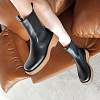 VAGA SHOES is a new participant in the Euro Shoes premiere collection
The Russian women's shoe factory VAGA SHOES will take part for the first time in the international exhibition of footwear and accessories Euro Shoes premiere collection in Moscow.
VAGA SHOES is a new participant in the Euro Shoes premiere collection
The Russian women's shoe factory VAGA SHOES will take part for the first time in the international exhibition of footwear and accessories Euro Shoes premiere collection in Moscow.
 Euro Shoes will start operating on February 19 in Moscow!
The winter session of the international exhibition of footwear and accessories Euro Shoes premiere collection will be held in Moscow at the Expocenter from February 19 to 22. The organizers promise the presence of all the main participants at the exhibition, as well as new names from Europe, Asia and Russia.
Euro Shoes will start operating on February 19 in Moscow!
The winter session of the international exhibition of footwear and accessories Euro Shoes premiere collection will be held in Moscow at the Expocenter from February 19 to 22. The organizers promise the presence of all the main participants at the exhibition, as well as new names from Europe, Asia and Russia.
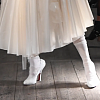 John Galliano and Christian Louboutin created the Tabi collection for Maison Margiela
Maison Margiela creative director John Galliano and French shoe designer Christian Louboutin released a shoe collaboration that was included in the Maison Margiela Artisanal spring 2024 couture collection. The design duo created six versions of the Tabi shoe. All shoe models in the collection have a split toe - a characteristic touch of the signature Tabi shoe model of the Maison Margiela brand. And Christian Louboutin gave the shoe its signature red sole.
John Galliano and Christian Louboutin created the Tabi collection for Maison Margiela
Maison Margiela creative director John Galliano and French shoe designer Christian Louboutin released a shoe collaboration that was included in the Maison Margiela Artisanal spring 2024 couture collection. The design duo created six versions of the Tabi shoe. All shoe models in the collection have a split toe - a characteristic touch of the signature Tabi shoe model of the Maison Margiela brand. And Christian Louboutin gave the shoe its signature red sole.
 Euro Shoes starts in a month in Moscow!
There is less than a month left before the main exhibition of shoes and accessories in Russia - Euro Shoes Premiere Collection. The event will take place from February 19 to 22 in Moscow at the Expocenter, and, as always, in partnership with the largest international clothing exhibition in Russia, CPM Premiere Moscow.
Euro Shoes starts in a month in Moscow!
There is less than a month left before the main exhibition of shoes and accessories in Russia - Euro Shoes Premiere Collection. The event will take place from February 19 to 22 in Moscow at the Expocenter, and, as always, in partnership with the largest international clothing exhibition in Russia, CPM Premiere Moscow.
 Christian Louboutin presented a collection in a cowboy style
At the Loubi Show in Paris, the French luxury brand Christian Louboutin presented its fall 2024 collection, following the trend - in the style of the Wild West. It included cowboy boots and rhinestone loafers.
Christian Louboutin presented a collection in a cowboy style
At the Loubi Show in Paris, the French luxury brand Christian Louboutin presented its fall 2024 collection, following the trend - in the style of the Wild West. It included cowboy boots and rhinestone loafers.
 Camper has released innovative sneakers - designers
Spanish brand Camper's new Roku sneaker features six interchangeable components to create up to 64 different looks and color combinations. Roku means "six" in Japanese.
Camper has released innovative sneakers - designers
Spanish brand Camper's new Roku sneaker features six interchangeable components to create up to 64 different looks and color combinations. Roku means "six" in Japanese.
 Fashion Week takes place in Moscow
Fashion Week takes place in the Russian capital. Events include fashion shows, markets where you can purchase clothes, bags and accessories, and a B2B Showroom for fashion industry professionals.
Fashion Week takes place in Moscow
Fashion Week takes place in the Russian capital. Events include fashion shows, markets where you can purchase clothes, bags and accessories, and a B2B Showroom for fashion industry professionals.
 Why Rendez-Vous and Yandex Lavka released a “bread bag”
Shoe retailer Rendez-Vous announced the launch of a spring collaboration with Yandex Lavka and released a roll that resembles the shape of a woman’s handbag. This “Bread Bag” is presented in the Yandex.Lavka application at a price of 249 rubles. On the product packaging there is a promotional code for 1000 rubles, which can be spent in the Rendez-Vous network.
Why Rendez-Vous and Yandex Lavka released a “bread bag”
Shoe retailer Rendez-Vous announced the launch of a spring collaboration with Yandex Lavka and released a roll that resembles the shape of a woman’s handbag. This “Bread Bag” is presented in the Yandex.Lavka application at a price of 249 rubles. On the product packaging there is a promotional code for 1000 rubles, which can be spent in the Rendez-Vous network.
 Fashion trends Fall-Winter 2023/24 for commercial footwear purchases
Permanent contributor to Shoes Report. Elena Vinogradova, an expert in sales and purchases in the fashion business, prepared an overview of the trends for the autumn-winter 2023/24 season especially for us.
Fashion trends Fall-Winter 2023/24 for commercial footwear purchases
Permanent contributor to Shoes Report. Elena Vinogradova, an expert in sales and purchases in the fashion business, prepared an overview of the trends for the autumn-winter 2023/24 season especially for us.
 MSCHF and Crocs launch "Big Yellow Boots"
Creator of the Big Red Boots, Brooklyn brand MSCHF has teamed up with American plastic clog and sandal brand Crocs for another oversized shoe. The new Big Yellow Boots will go on sale on August 9th.
MSCHF and Crocs launch "Big Yellow Boots"
Creator of the Big Red Boots, Brooklyn brand MSCHF has teamed up with American plastic clog and sandal brand Crocs for another oversized shoe. The new Big Yellow Boots will go on sale on August 9th.
 Five rules of professional lighting for a shoe store - something that is relevant in any season
When developing a lighting concept for shoe retailers, it is important to take into account not only the history of the brand, the architectural content of the premises, the target audience of the stores, but also the seasonality of the goods. With the onset of the cold season, client preferences change: bright weightless shoes are replaced by more massive models in discreet dark colors. Despite significant differences in summer and winter collections, the overall philosophy of the brand, its recognition should remain unchanged at any time of the year. Tatyana Ryzhova, an SR lighting expert in fashion retail, has identified five basic rules for a competent lighting concept for a shoe store for readers of the magazine, which will help to present winter assortment to customers in a winning way.
Five rules of professional lighting for a shoe store - something that is relevant in any season
When developing a lighting concept for shoe retailers, it is important to take into account not only the history of the brand, the architectural content of the premises, the target audience of the stores, but also the seasonality of the goods. With the onset of the cold season, client preferences change: bright weightless shoes are replaced by more massive models in discreet dark colors. Despite significant differences in summer and winter collections, the overall philosophy of the brand, its recognition should remain unchanged at any time of the year. Tatyana Ryzhova, an SR lighting expert in fashion retail, has identified five basic rules for a competent lighting concept for a shoe store for readers of the magazine, which will help to present winter assortment to customers in a winning way.
 Bertsy: what to look for when choosing a model
Bertsy and tactical boots are becoming more and more relevant footwear, and not only because of the start of the hunting season. In Russia, there are several dozen enterprises producing this type of footwear. Oleg Tereshin, Deputy Chief Technologist of ZENDEN, told Shoes Report about the differences and features of ankle boots and what you should pay attention to when buying them in specialized retail and online.
Bertsy: what to look for when choosing a model
Bertsy and tactical boots are becoming more and more relevant footwear, and not only because of the start of the hunting season. In Russia, there are several dozen enterprises producing this type of footwear. Oleg Tereshin, Deputy Chief Technologist of ZENDEN, told Shoes Report about the differences and features of ankle boots and what you should pay attention to when buying them in specialized retail and online.
 EURO SHOES presents an updated section of the GLOBAL SHOES exhibition with collections of shoe and bag brands from Asian countries
EURO SHOES premiere collection is expanding. Along with the traditional pool of leading European footwear brands from Germany, Spain, Italy and Turkey, several dozen footwear and bag brands from the Middle Kingdom will be presented in the GLOBAL SHOES section at the Moscow Expocentre from August 29 to September 1.
EURO SHOES presents an updated section of the GLOBAL SHOES exhibition with collections of shoe and bag brands from Asian countries
EURO SHOES premiere collection is expanding. Along with the traditional pool of leading European footwear brands from Germany, Spain, Italy and Turkey, several dozen footwear and bag brands from the Middle Kingdom will be presented in the GLOBAL SHOES section at the Moscow Expocentre from August 29 to September 1.
 I doubt and object: how to find an approach to difficult clients?
How good and serene would be the work of a salesperson if the customers were calm, cheerful, always knew exactly what they wanted, and bought, bought, bought! It is a pity that this is possible only in dreams. Therefore, we will not dream, but we will act. Together with Maria Gerasimenko, a permanent author of SR, we understand the doubts and objections of buyers and build a strategy for working with them. Our expert pays special attention to the two main objections of buyers, on which 82% of sales are lost.
I doubt and object: how to find an approach to difficult clients?
How good and serene would be the work of a salesperson if the customers were calm, cheerful, always knew exactly what they wanted, and bought, bought, bought! It is a pity that this is possible only in dreams. Therefore, we will not dream, but we will act. Together with Maria Gerasimenko, a permanent author of SR, we understand the doubts and objections of buyers and build a strategy for working with them. Our expert pays special attention to the two main objections of buyers, on which 82% of sales are lost.
 Summer Euro Shoes in synergy with CPM will be held from 29.08 to 01.09.2023
The global alliance of Euro Shoes and CPM exhibitions will present the new collections of famous world brands for the summer season 2024 in a single exhibition space on the same dates. The cooperation of the two largest, leading Russian fashion exhibitions makes it possible to attract a huge number of wholesale buyers of clothes, shoes, bags and accessories to the event. The largest business event for the entire Russian fashion industry will be held from August 29 to September 1, 2023 in Moscow, Expocentre Fairgrounds, Pavilion 1.
Summer Euro Shoes in synergy with CPM will be held from 29.08 to 01.09.2023
The global alliance of Euro Shoes and CPM exhibitions will present the new collections of famous world brands for the summer season 2024 in a single exhibition space on the same dates. The cooperation of the two largest, leading Russian fashion exhibitions makes it possible to attract a huge number of wholesale buyers of clothes, shoes, bags and accessories to the event. The largest business event for the entire Russian fashion industry will be held from August 29 to September 1, 2023 in Moscow, Expocentre Fairgrounds, Pavilion 1.  Two prominent Russian fashion designers Vyacheslav Zaitsev and Valentin Yudashkin passed away
One after another, two days apart, Vyacheslav Zaitsev and Valentin Yudashkin, outstanding fashion designers, whose work for the whole world was a kind of hallmark of fashionable Russia, left this world.
Two prominent Russian fashion designers Vyacheslav Zaitsev and Valentin Yudashkin passed away
One after another, two days apart, Vyacheslav Zaitsev and Valentin Yudashkin, outstanding fashion designers, whose work for the whole world was a kind of hallmark of fashionable Russia, left this world.
 World Footwear Yearbook: Global footwear production reaches 23,9 billion pairs and is back to pre-pandemic levels
The Portuguese association of shoe manufacturers APICCAPS published the 13th edition of the international statistical bulletin World Footwear Yearbook for 2023, according to which in 2022 the production and export of shoes worldwide increased by 7,6% and 9%, respectively, and the world production of shoes reached 23,9 billion couples and returned to pre-pandemic levels.
World Footwear Yearbook: Global footwear production reaches 23,9 billion pairs and is back to pre-pandemic levels
The Portuguese association of shoe manufacturers APICCAPS published the 13th edition of the international statistical bulletin World Footwear Yearbook for 2023, according to which in 2022 the production and export of shoes worldwide increased by 7,6% and 9%, respectively, and the world production of shoes reached 23,9 billion couples and returned to pre-pandemic levels.
 Rostov footwear brand Novak presented a collection of sneakers and sneakers
In the spring-summer 2023 season, the Rostov-on-Don shoe brand Novak presented a cute collection of sneakers and sneakers for every day. The upper of the shoe is made of genuine leather, suede, nubuck, the sole is made of light EVA.
Rostov footwear brand Novak presented a collection of sneakers and sneakers
In the spring-summer 2023 season, the Rostov-on-Don shoe brand Novak presented a cute collection of sneakers and sneakers for every day. The upper of the shoe is made of genuine leather, suede, nubuck, the sole is made of light EVA.
 Shoe educational program: what shoe soles are made of
“What is the difference between TEP and EVA? What does tunit promise me? Is PVC glue? What is the sole of these shoes made of? ”- the modern buyer wants to know everything. In order not to smash his face in front of him and be able to explain whether such a sole suits him in soles, carefully read this article. In it, process engineer Igor Okorokov tells what materials the soles of shoes are made of and what makes each of them so good.
Shoe educational program: what shoe soles are made of
“What is the difference between TEP and EVA? What does tunit promise me? Is PVC glue? What is the sole of these shoes made of? ”- the modern buyer wants to know everything. In order not to smash his face in front of him and be able to explain whether such a sole suits him in soles, carefully read this article. In it, process engineer Igor Okorokov tells what materials the soles of shoes are made of and what makes each of them so good.
 How to set prices that will earn
Some businessmen still confuse the concept of margin with the concept of trade margins and set prices for their goods, guided solely by the example of competitors. No wonder they go broke! Analyst at the Academy of Retail Technologies Maxim Gorshkov gives several tips and formulas with which you can set not only ruinous, but also profitable prices.
How to set prices that will earn
Some businessmen still confuse the concept of margin with the concept of trade margins and set prices for their goods, guided solely by the example of competitors. No wonder they go broke! Analyst at the Academy of Retail Technologies Maxim Gorshkov gives several tips and formulas with which you can set not only ruinous, but also profitable prices.
 Sales of shoes and accessories: effective techniques for business rhetoric
Which speech modules are effective in communicating with potential and current customers of shoe stores, and which are not, Anna Bocharova, a business consultant, knows.
Sales of shoes and accessories: effective techniques for business rhetoric
Which speech modules are effective in communicating with potential and current customers of shoe stores, and which are not, Anna Bocharova, a business consultant, knows.
 We form the salary of sellers: expert advice
“How do you charge your consultants for personal or general sales?” Is one of the most popular questions causing a lot of controversy and gossip on the online forums of retail business owners. Indeed, how to properly form the earnings of sellers? But what about bonuses, where to get a sales plan from, do employees allow them to buy goods at discounted stores? In search of truth, the Shoes Report turned to a dozen shoe retailers, but no company wanted to disclose its motivation system - the process of its development was too complicated and individual. Then we asked four business consultants, and finally became convinced that the topic of seller motivation is very complex, because even our experts could not come to a common opinion.
We form the salary of sellers: expert advice
“How do you charge your consultants for personal or general sales?” Is one of the most popular questions causing a lot of controversy and gossip on the online forums of retail business owners. Indeed, how to properly form the earnings of sellers? But what about bonuses, where to get a sales plan from, do employees allow them to buy goods at discounted stores? In search of truth, the Shoes Report turned to a dozen shoe retailers, but no company wanted to disclose its motivation system - the process of its development was too complicated and individual. Then we asked four business consultants, and finally became convinced that the topic of seller motivation is very complex, because even our experts could not come to a common opinion.
 The whole truth about Bayer. Who is he and how to become one?
Bayer is no longer a new, but still a popular and sought-after profession. It’s fashionable to be a buyer. Buyers are at the origins of the emergence and development of trends. If the designer offers his vision of fashion in the season, then the buyer selects the most interesting commercial ideas. It is on buyers that the policy of sales of stores and what, in the end, the buyer will wear depends on. This profession is surrounded by a magical fleur, often associated with a lack of understanding of what exactly is the work of a buyer.
The whole truth about Bayer. Who is he and how to become one?
Bayer is no longer a new, but still a popular and sought-after profession. It’s fashionable to be a buyer. Buyers are at the origins of the emergence and development of trends. If the designer offers his vision of fashion in the season, then the buyer selects the most interesting commercial ideas. It is on buyers that the policy of sales of stores and what, in the end, the buyer will wear depends on. This profession is surrounded by a magical fleur, often associated with a lack of understanding of what exactly is the work of a buyer.
 Technology Selling Issues
There is nothing worse than meeting the buyer with the words “Hello, can I help you with something?”, Because the seller works in the store just to help. Criticizing this well-established pattern of communication with the buyer, Andrei Chirkarev, business coach for effective sales and the founder of the New Economy project, shares the technology of truly selling issues with readers of Shoes Report.
Technology Selling Issues
There is nothing worse than meeting the buyer with the words “Hello, can I help you with something?”, Because the seller works in the store just to help. Criticizing this well-established pattern of communication with the buyer, Andrei Chirkarev, business coach for effective sales and the founder of the New Economy project, shares the technology of truly selling issues with readers of Shoes Report.
 Fur, and not only: types of lining
In the production of winter footwear, various materials are used that are designed to retain heat and meet the requirements of consumers: natural sheepleather, artificial fur, artificial fur from natural wool and others. All types of lining fur have their own advantages and disadvantages. Let's consider the properties of each of them.
Fur, and not only: types of lining
In the production of winter footwear, various materials are used that are designed to retain heat and meet the requirements of consumers: natural sheepleather, artificial fur, artificial fur from natural wool and others. All types of lining fur have their own advantages and disadvantages. Let's consider the properties of each of them.
 Retail Arithmetic
Before you begin to solve specific problems, you need to find out how accurately all the leaders of your company understand the basic terminology of retail.
Retail Arithmetic
Before you begin to solve specific problems, you need to find out how accurately all the leaders of your company understand the basic terminology of retail.
 How to fire a worker without tears, scandal and trial
Sooner or later, any manager is faced with the need to part with an employee. Properly and on time the dismissal procedure will save the company money, and the boss himself - nerves and time. But why sometimes, knowing that a break in relations is inevitable, we put off the decision for months?
How to fire a worker without tears, scandal and trial
Sooner or later, any manager is faced with the need to part with an employee. Properly and on time the dismissal procedure will save the company money, and the boss himself - nerves and time. But why sometimes, knowing that a break in relations is inevitable, we put off the decision for months?


